As a business, before you even think about doing or employing somebody to do local SEO services, it’s very important to know which keywords you want to target.
This is because you know your business and customers best!
SEO’s are usually tech people and only use data to make decisions - if they are not trained in the art of marketing, it's likely they don't understand the concept of customer avatars, and therefore make incorrect decisions for your campaign (and hard earned money).
That’s why, if you know your local SEO keywords, not only will you be able to make the right targeting decisions to ensure your campaign focuses on the right keywords, but you’ll also avoid getting taken for a ride by SEO companies who try to sell you keywords that aren’t a good fit for you.
This guide is designed to help you achieve exactly that.
- Easily uncover the right keywords to grow your business.
- Prepare you with the right information to make educated decisions about a SEO campaign or hiring a SEO company.
Keep reading, because on top of this, you'll also:
- Understand who your customers are & how they’re trying to find you (what words they are using and how many people do so every month).
- Discover if SEO is the right solution for you.
- Be prepared with the right keyword information if you’re looking to hire a local SEO company.
With no further adieu, let's check it out!
What Is Local SEO And Local Keyword Research?
Local SEO is the search optimisation strategy (SEO) that can help businesses to get discovered in local search results targeting keywords with the goal of being discovered in a local area.
Local SEO is different from traditional SEO.
Difference between Local SEO and SEO
While there are different ranking factors for Local SEO, the main difference between local SEO and SEO is the geographic scope of their focus.
Traditional SEO is concerned with improving the visibility and ranking of a website in search engine results pages (SERPs) on a global or national level, local SEO is focused on improving the visibility and ranking of a website for specific geographic regions, such as cities or neighbourhoods.
Local SEO typically involves optimising a website's content, structure, and links for local keywords, as well as setting up and maintaining a Google My Business listing, building local citations, and generating positive customer reviews to build a positive local reputation.
On the other hand, traditional SEO is focused on optimising a website for a broader range of keywords, regardless of their geographic location. This may involve optimising website content, structure, and links for keywords related to the products or services offered, as well as analysing and improving website speed, user experience, and other technical factors.
While both local SEO and SEO are important for driving traffic and generating leads for a business, local SEO is especially critical for businesses that rely on local customers, such as retail stores, restaurants, and service providers (if you want to know more about why business owners should care about local SEO as a whole… click here).
Now that you know the difference, it might be clearer why local SEO is important.
According to Local SEO statistics:
- 98% of consumers used the internet to find information about local businesses in 2022, up from 90% in 2019.
- Local businesses receive 94% of calls from GMB on weekdays
- 93% of consumers search Google Maps to find a business
- 72% of Google users will prefer a business that is closer to their location on Google Maps
- 59% of customers view Google My Business images before making a purchase
- 51% of GMB profiles receive more than 1000 views per month
- 60% of interactions on GMB profiles are website click
Any business with a physical location NEEDS a local SEO strategy. Simply because Google uses proximity factor as a ranking signal.
Search engine algorithms have evolved over the years.
When you Google something, algorithms include a proximity factor (or your location) into account to display relevant results.
This happens when you search for anything, and you don’t need to add “near me” or “location” in your search.
For example, I have searched for “pizza” here and can see the results based on my location:
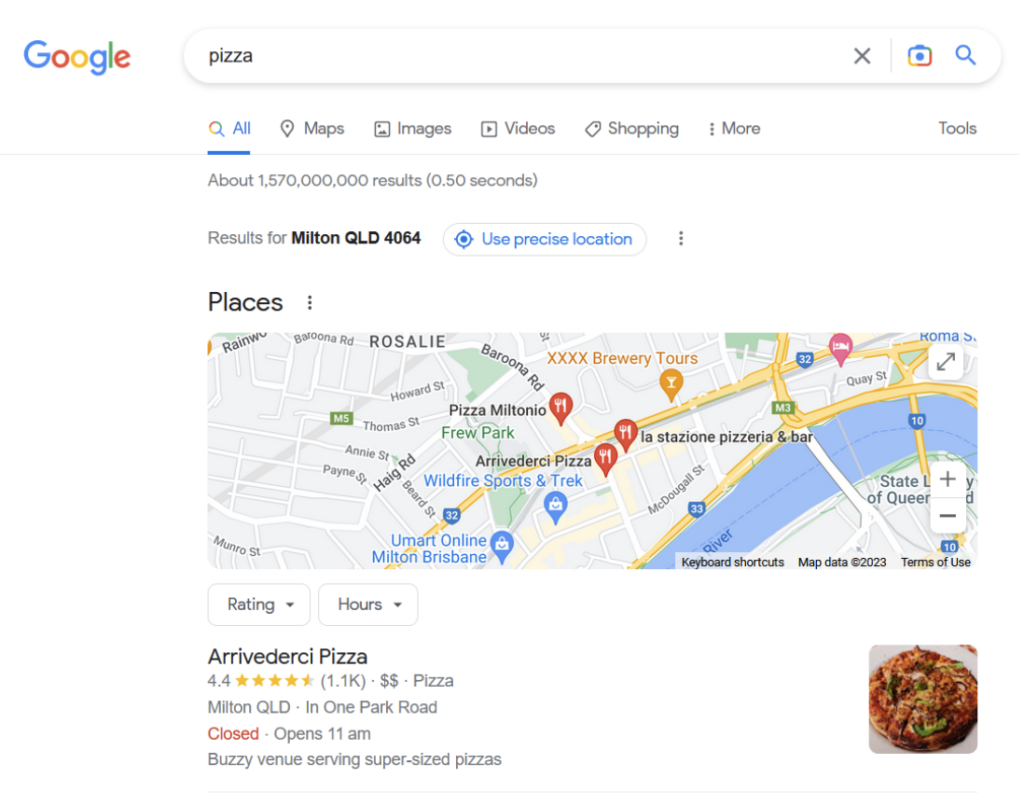
Local keyword research helps businesses understand what people are typing into search engines. It is a process of determining which keywords need to be used so they appear in SERPs.
While you can guess the common keywords related to your products or service, it doesn’t help in meeting your customer’s intent.
For example, if you are a plumber based in Brisbane a few keywords could be:
- Plumber Brisbane
- Emergency Plumber Brisbane
- Blocked Drains Plumber Brisbane
These are basic keywords and great if you are a big plumbing company that covers all of Brisbane.
But what if you’re just a one man band?
What if traveling from the south side to the north side isn’t economical, and instead you just want to get jobs on the southern side of Brisbane?
This is where local SEO gets very powerful.
You can target actual suburbs or regions or even just the services you want to narrow in on.
Knowing this information as a business owner is going to give you the right ammunition to not make your SEO campaign more profitable, but also keeps your company on track ensuring they aren’t targeting keywords you’ll never be able to turn into customers.
Here’s a list of example keywords narrowing in on suburbs, regions & services:
- Plumber Brisbane northside
- Plumber Brisbane southside
- Plumber Brisbane western suburbs
- Plumber Brisbane CBD
- Hot water installation and repairs
- Burst pipe repairs
- Leaking tap repairs
- Drain unblocking
- Leaking toilet repairs
People may be searching for plumbers but also very specific services they might want to get fixed.
Let’s look at another example to further explain how this very different in local keyword research.
For example, here are the SERPs for “Chiropractors Brisbane”
The first two results are sponsored posts and the remaining are Google Map Pack or Google Local Map Pack.
Being on the Google Map Pack is like being on a prime real estate location as the #1 spot gets high click through rates.
- More organic traffic - check
- More mobile traffic- check
- More calls - check
- High competitive advantage - check
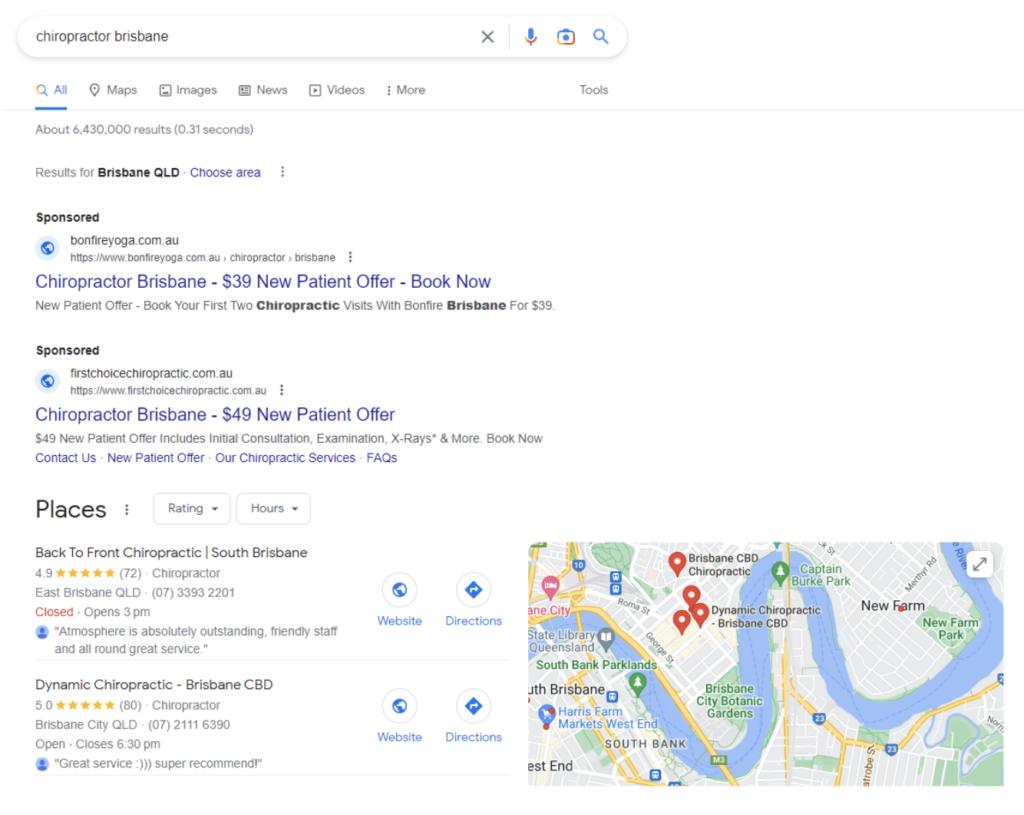
After this, Google first tries to help people answer immediate questions that they may have and then ranks the actual websites that have local relevant content.
To get local SEO keyword research right, you need to nail the commercial intent keywords to show up in the maps pack but you also need to have relevant content on your website that's both local and answers your customers questions.
If all this getting too hard that totally fine.
While this guide is designed for you do DIY your SEO the other purpose is for business owners to understand these concepts to then hire a SEO company that will do a good job.
If this makes sense and you'd like help from a professional SEO company to complete this keyword research you can learn more about our keyword research services here.
How Does Google Determine Local Rankings?
Here it is straight from the horses mouth:
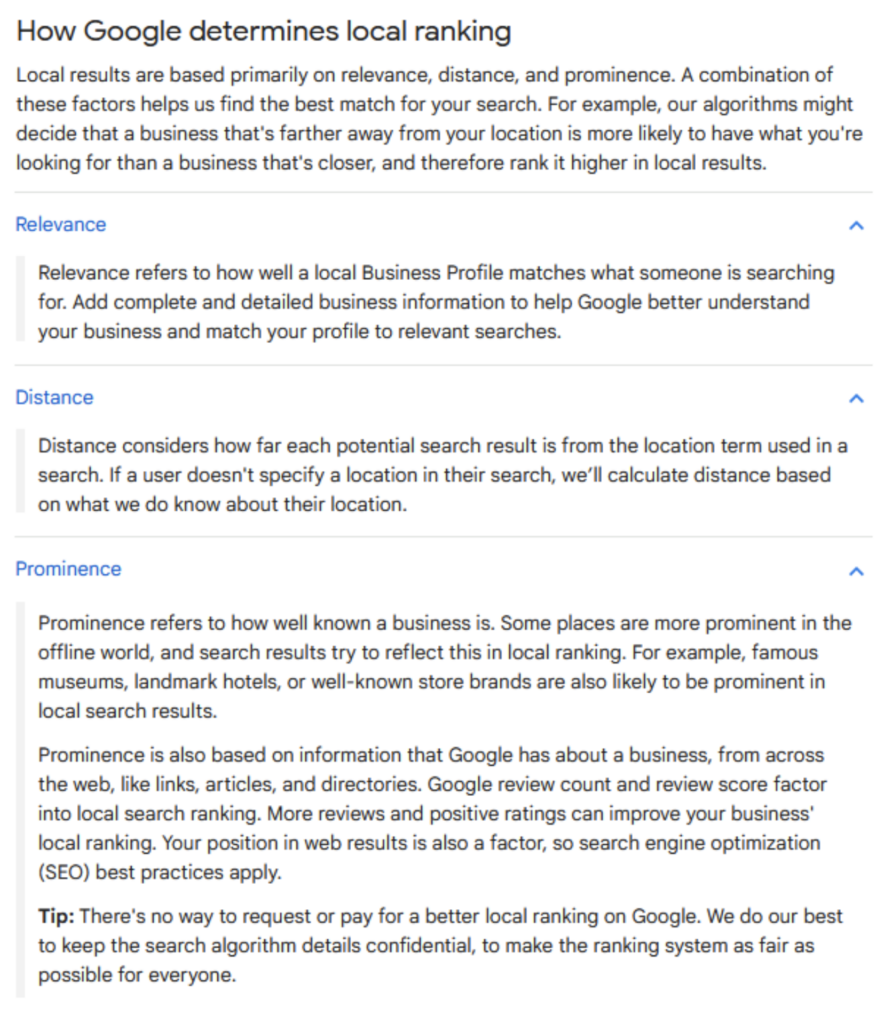
Why Is Keyword Research Essential For Local Businesses?
Keyword research is critical to gain understanding of your target audience, identify local search trends, stand out from the competition, and improve local search rankings.
Helps businesses understand their target audience
It can help you identify the words and phrases that their target audience is using to search for products or services in their area.
This knowledge enables you (or your content team) to create more relevant and effective content that resonates with potential customers.
Provides insights into local search trends
By analysing local search trends, you will gain insights into the types of products or services that are in high demand in their area. With this knowledge you could tailor your offerings and marketing strategies to better meet customer’s needs.
Makes businesses stand out from the competition
Keyword research can help you identify gaps in the market and find opportunities to differentiate themselves from your competitors.
By targeting keywords your competitors are not, you attract more customers and gain competitive advantage.
Improves local search rankings
By optimising your website and online presence for relevant local keywords, your are improving your chances of appearing in local search results. This will help you attract more local customers who are actively searching for your products or services. (For a full checklist for Local SEO click here.)
By now you must be armed with plethora of information regarding the importance of local keyword research.
Lets dive into our next section and talk about how to actually do it!
How To Conduct Local Keyword Research?
Step 1 - Identifying Your Target Audience
Identifying your target audience is the first step in developing a successful marketing strategy. Here’s how to do it.
Define your product or service - Its very simple, identify the USP of your offering and what sets it apart from your competitors.
It could be anything like 24x7 service, no callout fee, free shipping and returns or certified B-corp company.
If you are sourcing single-origin organic coffee beans, this could be a USP to target environmentally conscious customers.
Research your market - Understand the needs, wants and preferences of your customer. Gather information about their demographics, psychographics and behaviour patterns.
Create customer personas - Use this information to create detailed descriptions of your ideal customers. Make sure to include factors like age, gender, education, job title, hobbies, and interests. With this customer persona, you can create content useful for your readers.
For example, if you have identified women are more likely to hire your plumbers than men, you can utilise this habit to create content targeting women.
Here are two sample buyer persona that can make this clearer and help you learn what information to incorporate.
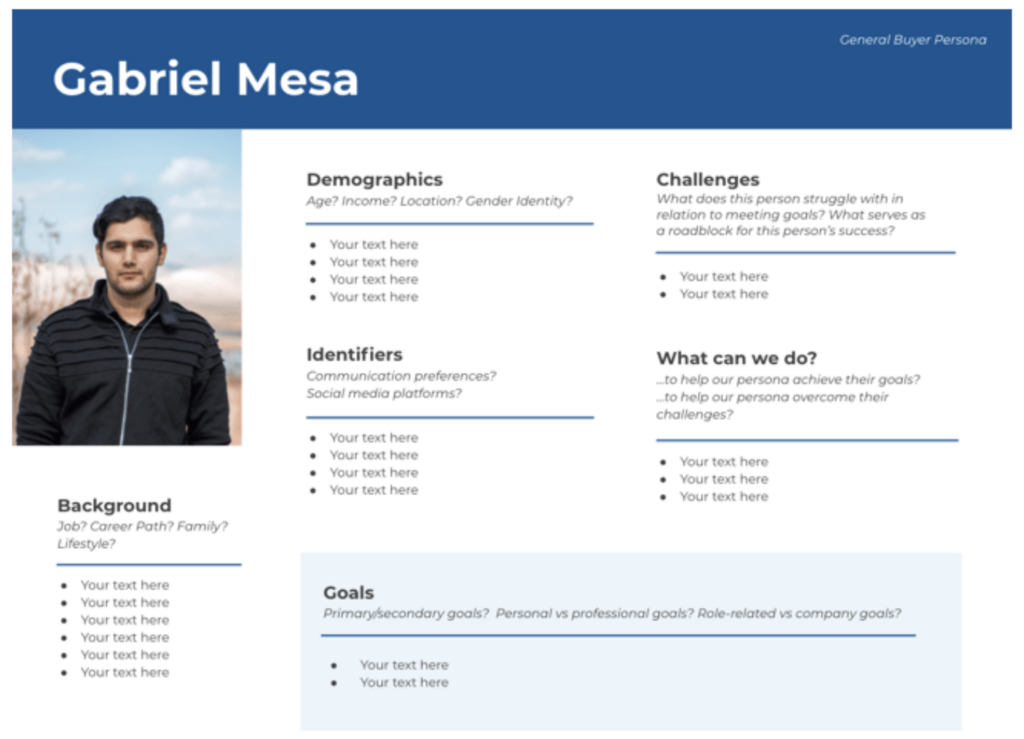
Source: Hubspot
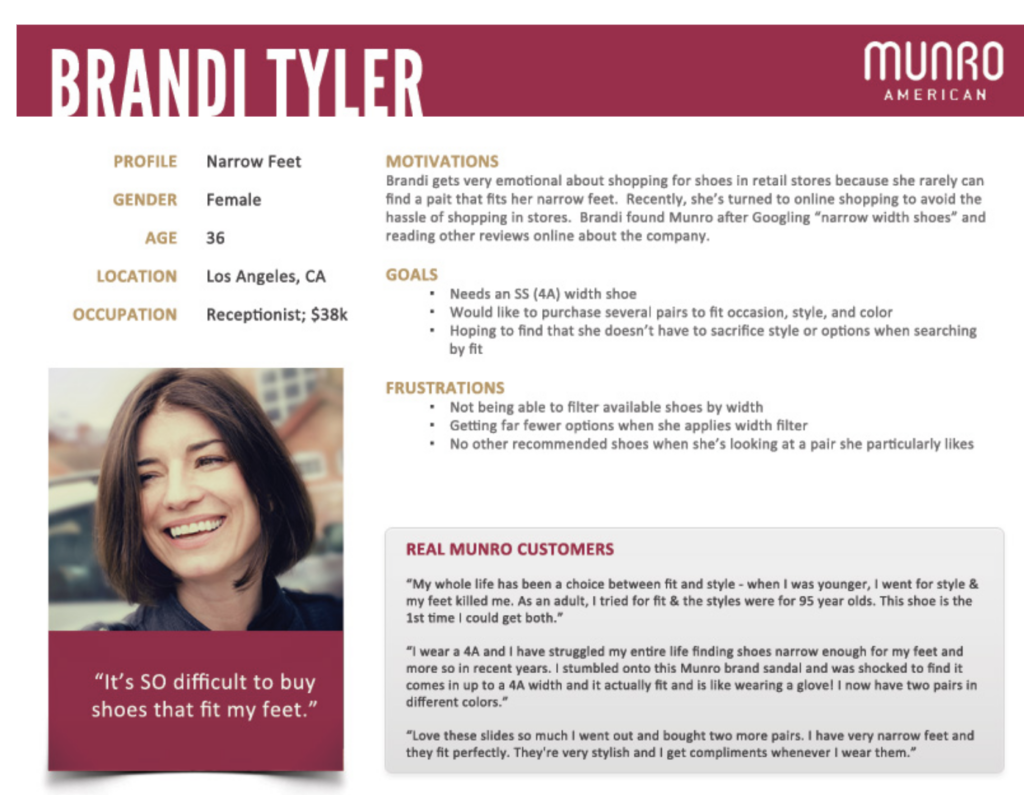
Source: Indie Game Girl
Analyse your competition - Check your competitors to see what strategies they are using to promote their services and attract customers. This can be a great starting point to identify gaps in the market, think out of the box and differentiate your business.
Tip: Use a combination of Google Analytics and Social Media Analytics (Meta Business Suite) to identify top performing pages, demographics, interests, location, etc.
For example, here’s a snapshot of Insights derived from Meta Business Suite.

Step 2 - Conducting The Keyword Research
- Using tools like Semrush, Ahrefs and Google Trends
- Leveraging customer reviews and local directories to find relevant keywords
- Analysing competitor keywords and search rankings
Now that you have analysed your business and customers, lets move to the cool stuff.
Jot down all the keywords and phrases relevant to your business
For example, if you are a clothing brand, a few keywords you may target are:
- Women’s clothing
- Womens clothes
- men clothing
- [brand name] clothing
- Clothes [brand(s)]
- [brand] outfits
- Mens clothing Australia
- men/women apparel
- Buy women/men clothing online
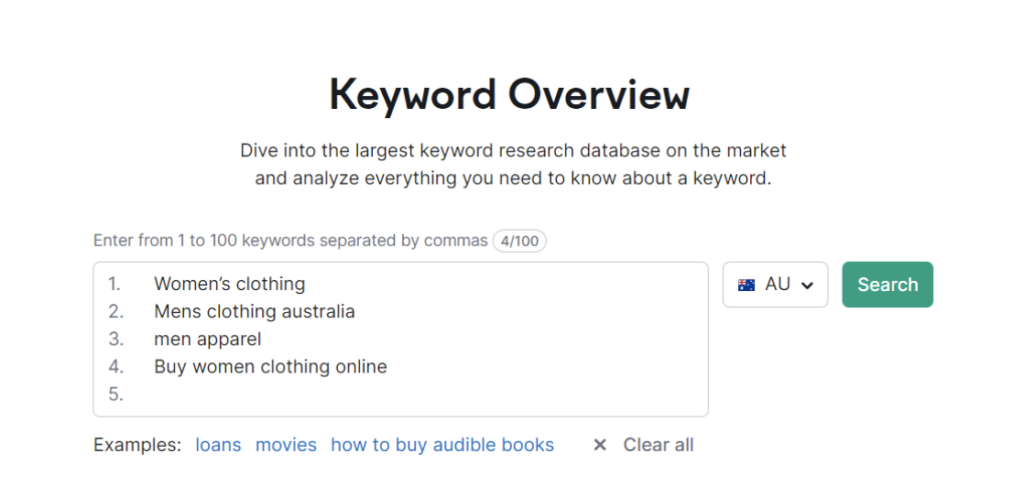
You could use free tools like Google Trend, Ubersuggest, Answer the Public or paid tools like Ahrefs and Semrush.
Depending on the tool you are using, enter your “seed keyword”.
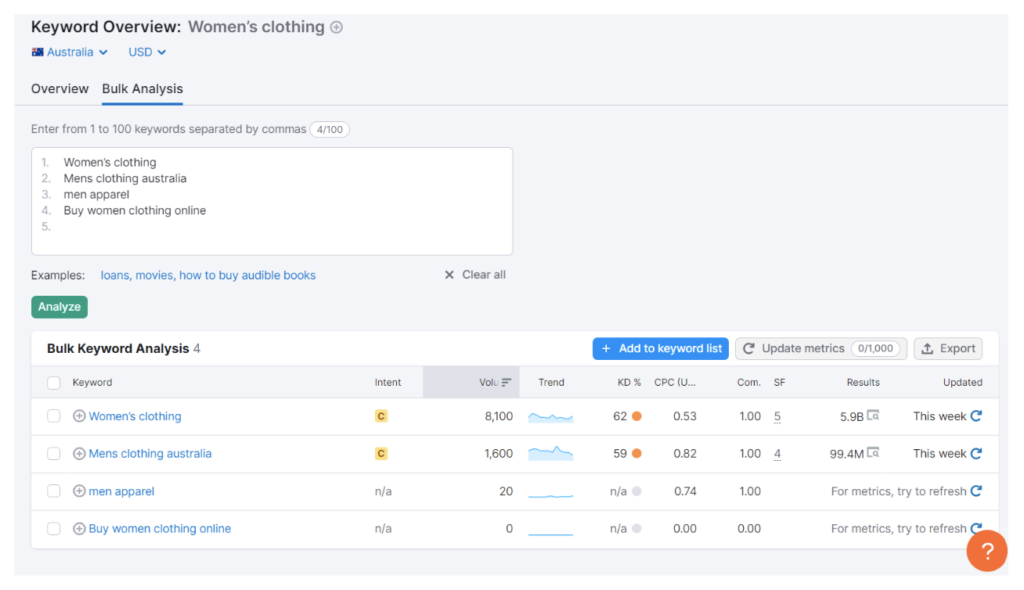
If you click on any of the keyword under “Bulk Keyword Analysis” you can see more detailed info like this:
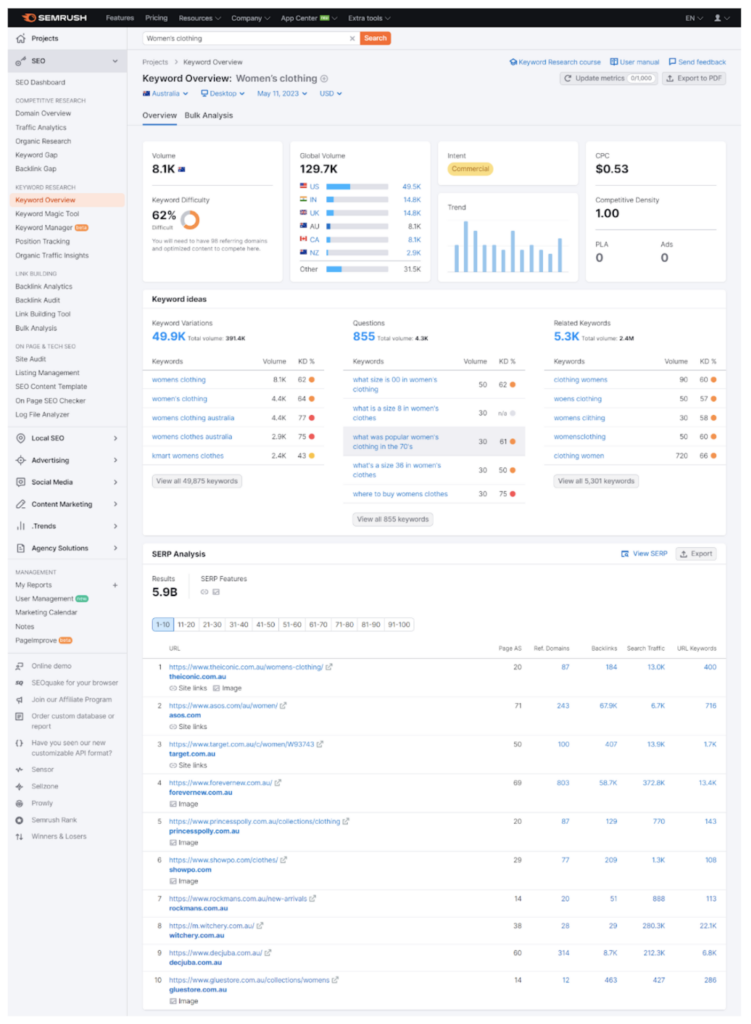
Note: Here you can see a list of websites ranking for the keyword “women’s clothing”. You can use this information to identify your competitors, compare their websites and map out your strategy.
This may look very overwhelming.
Try to filter the keyword by factors like:
- Intent
- Search volume
- Keyword difficulty
For example, here I have filtered keywords and it can help me narrow down my search results like this:
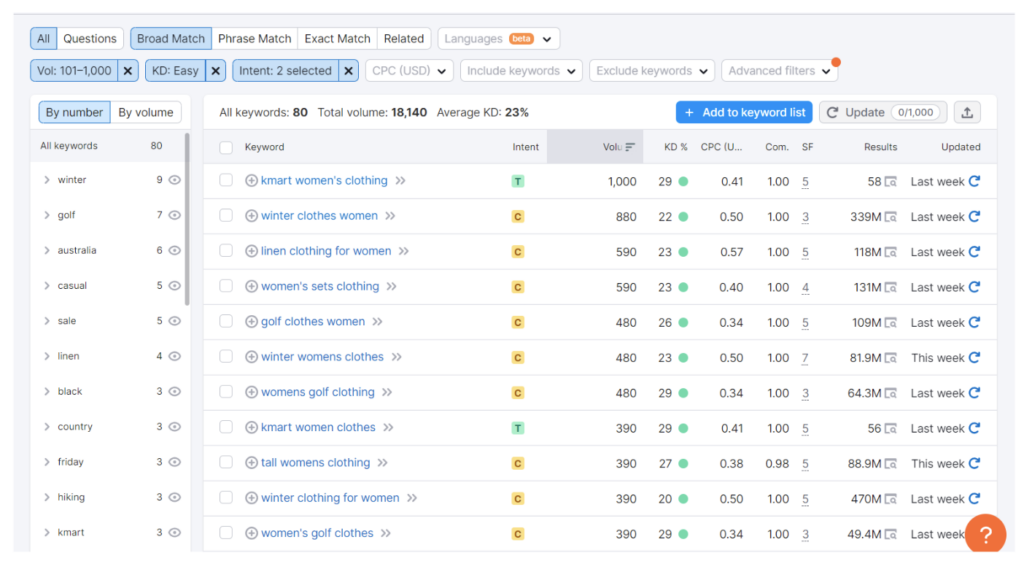
Now you can either analyse your keywords by this or export the data and add it to a spreadsheet (colour code it and organise it better).
Step 3 - Organising And Prioritising Your Keywords
This is an important part of a successful SEO strategy.
Here are some steps you can take to categorise and prioritise your keywords and create a keyword map to guide your content creation and optimisation efforts:
Categorise keywords by search volume, intent, keyword difficulty and competition:
One way to organise your keywords is to categorise them by search volume, relevance, keyword difficulty and competition.
You can use keyword research tools to help you categorise your keywords based on these factors.
For example: From the below list I can list out keywords like these and find more variations of these keywords:
- Winter clothes women
- Winter women's clothes
Prioritise your keywords
Once you have categorised your keywords, prioritise them based on your business goals and marketing objectives.
For example, you may want to focus on high-relevance, low-competition keywords that are likely to attract your target audience. You can also prioritise keywords based on your content strategy, focusing on those that are most relevant to the topics you plan to cover.
Say I need to promote my winter clothing collection, I can choose all keywords related to winter clothing and develop a content strategy based on this.
Create a keyword map
A keyword map is a visual representation of your website's content structure and the keywords that you plan to target for each page.
To create a keyword map, start by identifying the main topics or themes that you want to cover on your website. Then, identify the keywords that are most relevant to each topic or theme, and group them together.
It could look something like this:
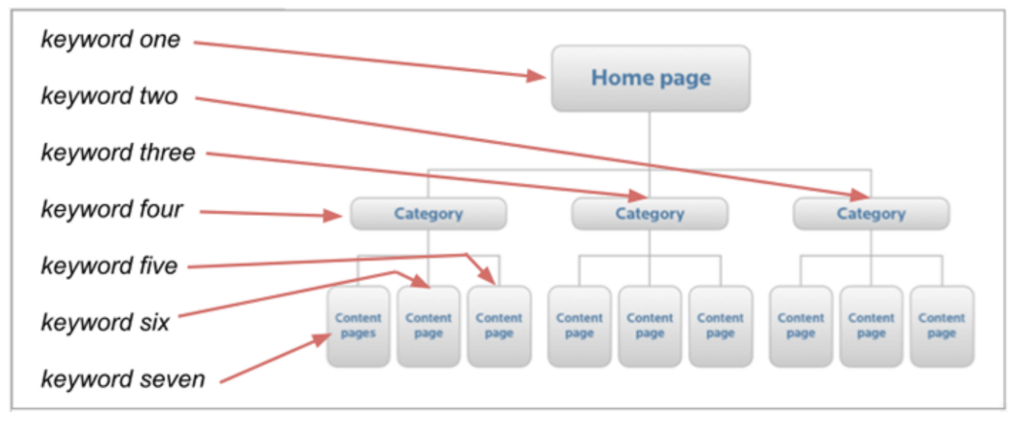
Source: Brand24
Assign keywords to specific pages
Once you have created your keyword map, assign the most relevant and important keywords to specific pages on your website.
This will help guide your content creation efforts and ensure that each page is optimised for the keywords that are most likely to drive traffic and conversions.
Monitor and adjust your strategy
Keyword research and optimisation is an ongoing process, so it's important to monitor your results and adjust your strategy as needed.
Use analytics tools to track your website's performance for different keywords and adjust your content and optimisation efforts based on what is working and what isn't.
Step 4 - Optimising Your Website For Local Search
Here are handy tips to optimise your website for local search.
- Include local keywords: Include your location in your website's content and metadata, such as your page titles, headers, descriptions, and URLs. This will enable search engines to showcase your business for local searches.
- Create location-specific landing pages: Create landing pages that are specific to each location where you have a physical presence. This will help you target local customers and provide them with relevant information. For example, if you own a website marketing business that provides services throughout Australia, make sure to include pages for all cities and suburbs.
- Claim and optimise your Google Business Profile: Google Business Profile is a free tool that allows you to manage your business's online presence across Google, including in search results and on Google Maps. Claim your profile and fill out all the relevant information, including your business hours, photos, and reviews. And keep it updated by adding regular photos, what’s new and offers! Check out our full Google Business Profile optimisation guide.
- Get listed in local directories: Get your business listed in local directories and review sites, such as Yelp, TripAdvisor, and Yellow Pages. Make sure your information is consistent across all directories.
- Use schema markup: Use schema markup to provide search engines with structured data about your business, including your address, phone number, and business hours. If you are an ecommerce business, include markup for LocalBusiness, product, review, HowTo, VideoObject.
- Use local link building: Build links from local websites and directories to your website. This will help improve your local search rankings and drive more local traffic to your site.
- Use social media: Use social media to connect with local customers and promote your business.
- Share content about your business and engage with your followers. Whether your audience is on Facebook, Instagram, Tiktok or LinkedIN, make sure you are engaging with them.
Step 5 - Tracking And Measuring Your Local SEO Efforts
If you don’t track it, you can’t measure it.
Make sure you are tracking your efforts using the right tools.
You could use keyword tracking tools like Semrush or Ahrefs for position tracking, backlink audit, and On-page SEO.
VERY IMPORTANT FOR LOCAL SEO: Make sure your rank tracker actually tracks the Local IP address of the area you’re targeting. Searches done from Sydney will be very different to Brisbane, ensuring your rank tracking tool uses a local IP address will give you the most accurate tracking method (check our guide on local rank tracking here).
At Websites That Sell we provide an entire service dedicated to tracking your SEO, you can learn more about our SEO Tracking services here.
Use Google Analytics, Google Search Console and Google Tag Manager. These tools can help you track your website traffic and see how much of it is coming from local search.
You can also set up conversion tracking to measure how many of your website visitors are converting into customers. This will give you insight into how effective your local SEO efforts are at driving traffic and generating leads.
Ready to take your local keyword research to the next level?
Kudos to you, if you have stayed through till the end.
In this article, we have discussed things like:
- How to conduct local keyword research.
- Difference between local SEO and SEO
- Importance of keyword research
- How to conduct local keyword research
Keyword research is quite simple once you have done it. But remember it is only part of the puzzle.
Once you have completed your keyword research, make sure you incorporate the keywords in your content.
Ensure your readers are getting value from your content.
Show them E-EAT (Experience, Expertise, Authoritativeness, and Trustworthiness).
If all of this seems too hard, however you are now armed with the right information to talk to a SEO company we’d love to have a chat. You can learn more about our local SEO services here, request a free SEO quote here or try the old fashion way - pick up the phone dial 1300 974 367 and speak to one of our friendly team members about how we can help you.
